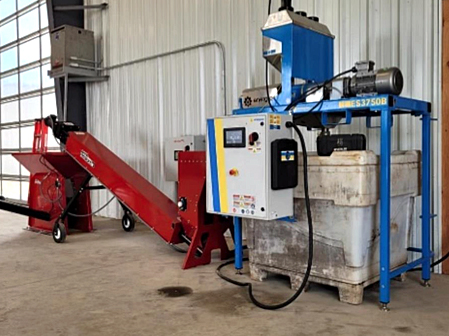NEWTON – Hofarms Ltd. of Newton is the first of a number of Canadian farms using Energrow’s newest automated roasting technology. This automated and electric soybean processing equipment is designed specifically for individual farms to use. It transforms raw soybeans into a heat-treated soybeans and/or soymeal which can be feed in both ruminant and non-ruminant diets.
Based out of Listowel, Energrow manufactures oilseed pressing systems that enable farmers to press their soybeans directly on-farm, producing both an expeller pressed Soyex soybean meal and soy oil. The meal replaces over 75 per cent of a farm’s purchased proteins and fats and the oil is purchased back by Energrow. Energrow is also the Canadian distributor for Red Jacket Roasters, based in the U.S., with whom they co-developed a roasting system for the Soyex expeller soybean meal from the Energrow presses.
“It’s sure been an exciting few years,” says Jasmin Hofer, founder and CEO of Energrow. “Though COVID-19 travel restrictions and cancelled events reduced our travel in the U.S., our team used the extra time to collaborate with like-minded companies to test and develop new products.
“We’ve had a lot of demand from farmers for a system like this and it’s been years in the making. We’ve had numerous prototypes over the years, none matching the consistency, efficiency, and quality of this 1044S Red Jacket System. Not only that, but the system is also affordable, easy to use and safe to run unattended in dusty farm environments.”

“It’s a dream come true,” added Ernst Hofer, owner of Hofarms Ltd. The local 400-acre cash crop farm produces specialty non-GMO feed mixes for local farmers for all kinds of livestock. “The first Energrow Pressing System was developed with my daughter, Jasmin, on this very farm over 15 years ago and now the process is complete with an add-on heat treatment system.”
The pressing system on its own makes a palatable soymeal for ruminant animals like dairy cows, goats, or sheep, but in order for the meal to be fed to non-ruminant animals such as poultry and hogs it needs to be heat treated. The heat treatment can also produce a higher protein bypass in ruminant diets.
“This innovation is significant because farmers need control over their fluctuating feed and commodity costs more than ever,” says Jasmin Hofer. “It leaves more money in the farmer’s pocket. Pressing enables farmers to feed their soybeans more like their forages and make feed costs more predictable. Feed costs are the biggest expense on livestock farms, accounting for 21 per cent of expenses on a dairy farm and 39 per cent on hog farms and in recent months increased significantly. We are getting a lot of demand as feed prices have been a killer for cash flow on livestock farms the last few months. Especially with recent grant opportunities, it’s clear farmers are exploring their options to reduce and better control their feed costs.”




